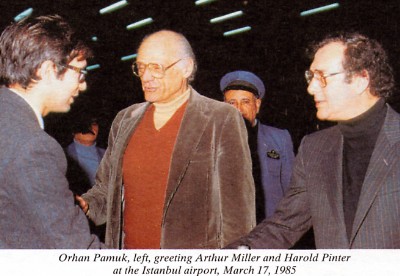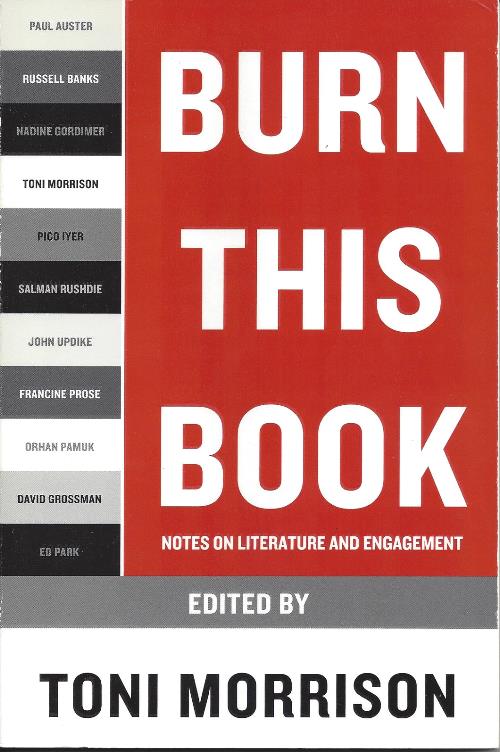|
|
Hãy đốt cuốn
sách này
Freedom
to Write
By Orhan Pamuk
The following was given on
April 25 as the inaugural PEN Arthur Miller Freedom to Write Memorial
Lecture.
Tự Do Viết.
Đọc tại PEN cùng dịp với
DTH.

In March 1985 Arthur
Miller and Harold Pinter made a trip together to Istanbul. At the time,
they were perhaps the two most important names in world theater, but
unfortunately, it was not a play or a literary event that brought them
to Istanbul...'I
stand by my words. And even more, I stand by my right to say them...'
When
the acclaimed Turkish writer Orhan Pamuk recalled his country's mass
killing of Armenians, he was forced to flee abroad. As he prepares to
accept a peace award in Frankfurt, he tells Maureen Freely why he had
to break his nation's biggest taboo.
"Tôi giữ vững những lời nói của tôi. Tôi giữ vững quyền của tôi, được
nói những lời đó ra trước bàn dân thiên hạ."
Nhưng
ông ta nói gì vậy?
Pamuk said that 'a million Armenians and 30,000 Kurds were killed in
this country and I'm the only one who dares to talk about it'.
Ông
nói, "một triệu người Armenians, và 30 ngàn người Kurds
đã bị làm cỏ, trong xứ sở này, và tôi là người độc nhất dám nói ra
chuyện làm cỏ này"
Sunday
October 23, 2005
The Observer [Guardian online]
Ông
là nhà văn Thổ Nhĩ Kỳ, và đã xì ra vụ trên, với một tờ báo ở Thuỵ Sĩ,
vì vụ này mà phải chạy trốn quê hương. Ông nhà nước nói, có vài trăm
người bị chết thôi mà, thằng cha đó nói hoảng, tố ẩu!
Gấu
bỗng nghĩ đến vụ Mậu Thân.
Vụ
này, cũng chưa từng xẩy ra!
Mà
nếu có xẩy ra, thì cũng chỉ vài thằng Nguỵ có nợ máu với nhân dân, bị
trừng trị, và nếu như có hàng ngàn người dân Huế bị giết, thì đúng là
thằng Nguỵ nó giết, rồi đổ tội cho Cách Mạng!
Cách Mạng làm sao lại giết người, nhất là những thường dân vô tội?
Nhưng
giá mà có một ông nhà văn 'Cách Mạng nào đó', thí dụ như me-xừ gì gì
đó, bỗng hùng hồn tuyên bố như ông nhà văn Thổ kia, thì thú biết
mấy! (1)
Cuộc chiến Mít, là do VC phịa ra, rồi thực hiện nó, với cái giá thật là
khủng khiếp về con số người chết, trong cuộc chiến, sau đó, và 1 nước
Mít như hiện nay.
I have personally known writers who have
chosen to raise forbidden topics purely because they were forbidden. I
think I am no different. Because when another writer in another house
is not free, no writer is free. This, indeed, is the spirit that
informs the solidarity felt by PEN, by writers all over the world.
Sometimes my friends rightly tell me or someone else, "You shouldn't
have put it quite like that; if only you had worded it like this, in a
way that no one would find offensive, you wouldn't be in so much
trouble now." But to change one's words and package them in a way that
will be acceptable to everyone in a repressed culture, and to become
skilled in this arena, is a bit like smuggling forbidden goods through
customs, and as such, it is shaming and degrading.
Cá nhân tôi, tôi biết, có
những nhà văn dám đụng vô những đề tài cấm đoán, hoàn toàn do, đúng chỉ
vì, trong trắng như 1 lần sự thực [TTT], purely, chúng là những đề tài
bị cấm đoán, Tôi nghĩ, tôi cũng thế. Bởi là vì khi một nhà văn khác,
trong 1 căn nhà khác, không tự do, thì đếch có một nhà văn nào tự do.
Pamuk
Đúng là 'bad' boy!

Hãy đốt cuốn sách này!
May quá, có mấy bài đã
giới thiệu trên TV, của Salman Rushdie [Ghi chú về Viết và Nước, Notes on Writing
and Nation], David Grossman [Viết
trong Bóng Tối]. Sẽ giới thiệu tiếp bài của Toni Morrison: Peril:
Hiểm nguy
Peril
Toni Morrison
Authoritarian regimes,
dictators, despots are often, but not always, fools. But none is
foolish enough to give perceptive, dissident writers free range to
publish their judgments or follow their creative instincts. They know
they do so at their own peril. They are not stupid enough to abandon
control (overt or insidious) over media. Their methods include
surveillance, censorship, arrest, even slaughter of those writers
informing and disturbing the public. Writers who are unsettling,
calling into question, taking another, deeper look.
Writers-journalists, essayists, bloggers, poets, playwrights-can
disturb the social oppression that functions like a coma on the
population, a coma despots call peace; and they stanch the blood flow
of war that hawks and profiteers thrill to.
That is their peril.
Ours is of another sort.
How bleak, unlivable, insufferable existence becomes
when we are deprived of artwork. That the life and work of writers
facing peril must be protected is urgent, but along with that urgency
we should remind ourselves that their absence, the choking off of a
writer's work its cruel amputation, is of equal peril to us. The rescue
we extend to them is a generosity to ourselves.
We all know nations that can be identified by the
flight of writers from their shores. These are regimes whose fear of
unmonitored writing is justified because truth is trouble. It is
trouble for the warmonger, the torturer, the corporate thief, the
political hack, the corrupt justice system, and for a comatose public.
Unpersecuted, unjailed, unharassed writers are trouble for the ignorant
bully, the sly racist, and the predators feeding off the world's
resources. The alarm, the disquiet, writers raise is instructive
because it is open and vulnerable, because if unpoliced it is
threatening. Therefore the historical suppression of writers is the
earliest harbinger of the steady peeling away of additional rights and
liberties that will follow. The history of persecuted writers is as
long as the history of literature itself. And the efforts to censor,
starve, regulate, and annihilate us are clear signs that something
important has taken place. Cultural and political forces can sweep
clean all but the "safe," all but state-approved art.
I have been told that there are two human responses
to the perception of chaos: naming and violence. When the chaos is
simply the unknown, the naming can be accomplished effortlessly-a new
species, star, formula, equation, prognosis. There is also mapping,
charting, or devising proper nouns for unnamed or stripped-of-names
geography, landscape, or population. When chaos resists, either by
reforming itself or by rebelling against imposed order, violence is
understood to be the most frequent response and the most rational when
confronting the unknown, the catastrophic, the wild, wanton, or
incorrigible. Rational responses may be censure, incarceration in
holding camps, prisons, or death, singly or in war. There is however a
third response to chaos, which I have not heard about, which is
stillness. Such stillness can be passivity and dumbfoundedness; it can
be paralytic fear. But it can also be art. Those writers plying their
craft near to or far from the throne of raw power, of military power,
of empire building and counting-houses, writers who construct meaning
in the face of chaos must be nurtured, protected. And it is right that
such protection be initiated by other writers. And it is imperative not
only to save the besieged writers but to save ourselves. The thought
that leads me to contemplate with dread the erasure of other voices, of
unwritten novels, poems whispered or swallowed for fear of being
overheard by the wrong people, outlawed languages flourishing
underground, essayists' questions challenging authority never being
posed, un-staged plays, canceled films-that thought is a nightmare. As
though a whole universe is being described in invisible ink.
Certain kinds of trauma visited on peoples are so
deep, so cruel, that unlike money, unlike vengeance, even unlike
justice, or rights, or the goodwill of others, only writers can
translate such trauma and turn sorrow into meaning, sharpening the
moral imagination.
A writer's life and work are not a gift to mankind;
they are its necessity.
TM
Cuộc đời và tác phẩm của một nhà văn đếch phải là một món quà cho nhân
loại. Chúng là sự cần thiết của nó.
|
|


